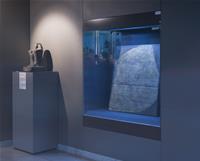BA Antiquities Museum Showcases a Replica of Rosetta Stone
Posted on

The BA Antiquities Museum has recently showcased an exact replica of the Rosetta Stone in order to introduce visitors to such a momentous antiquity. The Rosetta Stone, which is displayed at the British Museum in London, is considered as one of the most significant archaeological discoveries in history. It was the key element in deciphering the ancient Egyptian language, and it is one of the most important Egyptian monuments that led to the emergence of Egyptology.
The aforementioned replica is the only non-original item showcased at the Antiquities Museum. A documentary on the Rosetta Stone will also be screened at the museum.
It is noteworthy that the Rosetta Stone was discovered by Lieutenant Pierre-François Bouchard on 15 July 1799 while his soldiers were strengthening the defenses of and expanding Fort Julien near the Egyptian port city of Rosetta (modern-day Rashid) in the Nile Delta. The stone was then transported to Britain in 1801, and it was gifted to the British Museum by King George III in 1802. The young Frenchman Jean-François Champollion successfully identified various symbols of the ancient Egyptian language on the stone and eventfully managed to decipher its secrets through comparing between the Greek, demotic, and hieroglyphic texts inscribed on the stone. Jean-François Champollion’s achievement thus paved the way to the emergence of Egyptology in 1822.